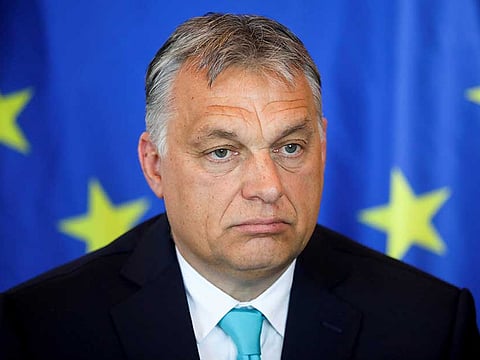Orban launches his offensive on Europe
As the Hungarian prime minister marshals the resurgent nationalist Right, his own agenda is steadily coming into focus

A few days ago, Hungarian Prime Minister Viktor Orban delivered an annual speech to ethnic Hungarians at a summer camp in Romania. He largely echoed the remarks he had made last year, when he bemoaned European liberalism and championed the continent’s Christian identity. But what seemed like boilerplate nationalist rhetoric then has more force now.
Backed by a hefty new electoral mandate, Orban has a broader mission in mind. He urged his right-wing comrades across Europe to “concentrate all our strength” on “important and decisive” 2019 elections for the European Parliament. He framed the challenge in grand historic terms, summoning his allies to cast out those in power still motivated by the values of “1968” — shorthand in Europe for liberal politics based on human rights, the rule of law and open, inclusive societies. “Next May we can wave goodbye not only to liberal democracy ... but also to the entire elite of ‘68,” Orban said.
The Hungarian leader emphatically drew the battle lines. “Let us confidently declare that Christian democracy is not liberal,” he said. “Liberal democracy is liberal, while Christian democracy is, by definition, not liberal: it is, if you like, illiberal.” In this goal, he joins Steve Bannon, the former adviser to United States President Donald Trump, who recently launched a Brussels-based initiative to boost the role of nationalists across the continent within the European Union (EU). Bannon has hailed Orban in the past as a European counterpart to Trump, seeing the Hungarian leader’s strident anti-immigrant and ultranationalist politics as “Trump before Trump”.
The similarities are obvious. Orban built a fortified barrier along his country’s southern border to keep out Syrian refugees and other migrants. He extols blood-and-soil nationalism over democratic values. He and his allies growl about critical media coverage as “fake news” and indulge in tirades against “globalist” elites.
Unlike Trump, though, Orban has had more concrete success in advancing his illiberal agenda. There has been a steady erosion of checks on his rule since he took office in 2010 (he had also served as prime minister from 1998 to 2002 in his former guise as a liberal). After his April reelection, his government pushed through a law criminalising any individual or organisation that aided undocumented migrants — with cruel irony, it passed on World Refugee Day. There are now growing questions about the autonomy of Hungary’s judiciary, while the country’s media is disproportionately in Orban’s camp.
Last Wednesday, an Orban loyalist completed a takeover of a prominent independent TV channel that had been run by the prime minister’s opponents — a phenomenon familiar to anyone who has watched Turkish President Recep Tayyip Erdogan ruthlessly consolidate power and subdue Turkey’s independent media over the past decade.
For Europe, Orban is setting a new precedent. “Although Orban governs a small country, the movement he represents is of global importance,” wrote Bulgarian political philosopher Ivan Krastev earlier this year. “In the West, his style of illiberal democracy is likely to be the major alternative to liberalism in the coming decades.”
Unlike populists further to the West, Orban does not seek the EU’s dissolution. Indeed, the Hungarian economy has grown under his watch thanks in part to funds and assistance from Brussels. But he imagines co-opting the bloc and moving it closer in line with his and Trump’s right-wing nationalism.
“He has successfully positioned himself within the European centre-right,” wrote Bloomberg View’s Leonid Bershidsky, referring to the continued membership of Fidesz, Orban’s party, in the prominent European People’s Party (EPP) faction in the European Parliament. That bloc includes the parties of prominent conservative leaders like German Chancellor Angela Merkel.
While some moderates have called on the EPP to expel Fidesz, Orban remains in a comfortable position. “Better to keep them in so we can talk to them directly,” said German conservative politician Manfred Weber, head of the EPP, to Politico last month. “He always listens at a certain point. He runs off and has to be told to stop, but he usually does.”
But that condescending view belies Orban’s growing clout, especially among the continent’s mainstream right-wing parties. “When Orban rails against the liberal EU elite,” wrote Bershidsky, “he does that on behalf of the right-wingers in traditional parties ... To see if Europe goes in this direction, it’s worth listening for echoes of Orban in the speeches of mainstream conservatives and watching the party platforms for the 2019 European Parliament election. The shift to the right, if it continues, will not be as one-dimensional as a shift in support to the protest parties. It’ll happen from the inside of the conservative flank.”
It’s alarming to contemplate what such a shift represents. “If the liberals who dominated in the 1990s were preoccupied with the rights of ethnic, religious, and sexual minorities, this new consensus is about the rights of the majority,” wrote Krastev. Orban, meanwhile, is among a number of outspoken right-wing nationalists in Europe who support easing tensions with the Kremlin and dropping E.U. sanctions on Russia.
And while Trump may be the source of widespread derision among the European establishment, Orban expresses his admiration for the US president. In his speech, Orban celebrated how Trump has “made good on his promises”. He praised Trump’s attacks on the multilateral international order, largely built through decades of US cooperation with blocs like the EU and the Group of Seven. While Trump’s critics cast his actions as those of an impetuous and impatient demagogue, Orban said Trump was “making systematic progress with the precision of an engineer”.
The truth, though, may be closer to home: As Orban marshals the resurgent nationalist Right, it’s his project that is steadily coming into focus.
— Washington Post
Ishaan Tharoor writes about foreign affairs for the Washington Post.



